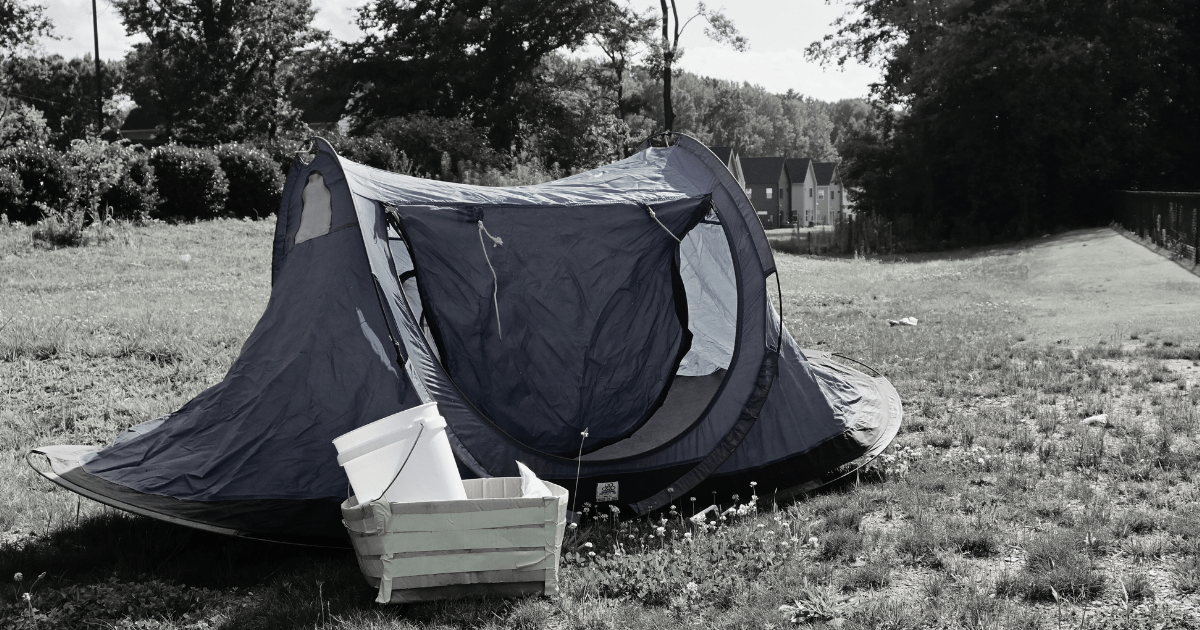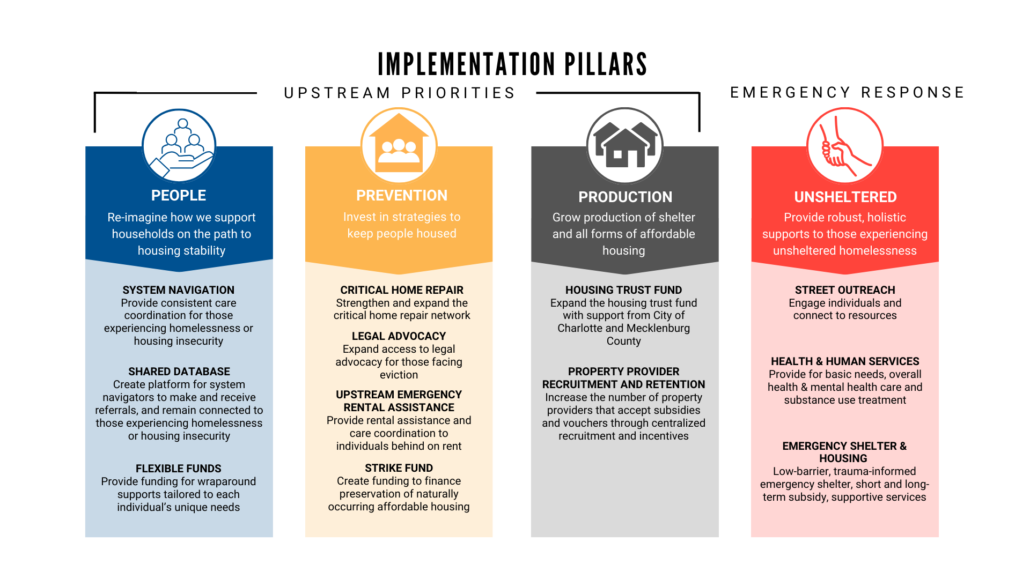A Home For All: Emergency Response Pillar
Jessica Lefkowitz
Executive Director
Hearts for the Invisible Charlotte Coalition
KT Harcourt-Medina
Evaluation Manager
United Way of Greater Charlotte
In August, United Way of Greater Charlotte (United Way) released the A Home For All Implementation Plan. Building on the priorities identified in the Strategic Framework, the Implementation Plan outlines which priorities to advance first in order to address housing instability and homelessness across the Charlotte-Mecklenburg region. We recently posted a series of blogs examining the initial three pillars of the A Home For All Implementation Plan: People, Prevention, and Production. We have since added a fourth pillar, responding to growing concern about the need to support those experiencing unsheltered homelessness.
This blog provides an overview of the Emergency Response pillar.
EMERGENCY RESPONSE PILLAR
According to the HUD 2022 Annual Homeless Assessment Report (AHAR), unsheltered homelessness increased nationally by 3.4% (7,752 people) between 2020 and 2022. Mecklenburg County identified 288 people experiencing unsheltered homelessness during the 2023 Point-in-Time Count (Charlotte-Mecklenburg SoHIH Report, 2023). In response to growing concern for those experiencing unsheltered homelessness, United Way of Greater Charlotte convened key community stakeholders to outline a robust, holistic response, and to prioritize and sequence the investments needed to advance such a response. These elements are reflected in the new, Emergency Response pillar, and the community stakeholders have agreed to form a new A Home For All implementation team.
Unsheltered homelessness presents unique challenges compared to sheltered homelessness, with individuals reporting more pronounced physical and mental health issues. These difficulties are often linked to exposure to violence and traumatic experiences encountered while living without shelter. Effectively addressing unsheltered homelessness demands a comprehensive and integrated approach that involves street outreach, health and human services, emergency shelter and housing.
Street outreach plays a pivotal role in connecting individuals with resources and providing system navigation. Street outreach consists of a multidisciplinary team comprised of clinical and nonclinical staff, who meet people where they are without judgement and help them navigate various elements of the system. The team starts the engagement process with rapport building, then focuses on getting vulnerable individuals and families connected to community resources such as Medicaid, SNAP, identification services, mental health and substance use services and more, with a primary goal of getting people into shelter, transitional housing, or permanent housing.
Health and human services address basic needs, healthcare, and mental health and substance use treatment, and go hand-in-hand with street outreach. Those facing unsheltered homelessness often rely on public and emergency health services at a rate nearly three times higher than those who have secure shelter (e.g., Coe et al., 2015; Routhier et al., 2023). Research has consistently shown that helping neighbors experiencing unsheltered homelessness get connected to housing and resources significantly decreases their use of high-cost emergency medical services (e.g., Chimowitz & Ruege, 2023). Increasing the ability of flexible funds for health and human services would greatly aid street outreach by allowing outreach workers to meet immediate needs.
Lastly, emergency shelter and housing, particularly low-barrier and non-congregate options, are crucial components of the solution. Low-barrier options, aligning with a housing-first approach, provide a safe haven for individuals to access necessary resources. Non-congregate options enable individuals to engage in social interactions on their terms, often fostering a sense of safety, particularly for those grappling with mental health challenges or traumatic experiences.
The City of Charlotte and Mecklenburg County have committed to addressing rising rates of people experiencing unsheltered homelessness, with tangible efforts underway. In addition to funding street outreach through Hearts for the Invisible Charlotte Coalition, the County has allocated ARPA funds to Block Love Charlotte for them to open a new Day Services Center and to Roof Above for them to renovate Roof Above’s existing Day Services Center.
Building on the County’s efforts, the City will be funding Hearts for the Invisible Charlotte Coalition to establish an additional multidisciplinary team to support unsheltered neighbors who sleep in the Uptown and South End areas of Charlotte. The City has also funded rental subsidies and supportive services for 10 individuals who are experiencing chronic homelessness and are exploring a longer-term investment in permanent supportive housing.
Additional investments are needed to fully realize a holistic solution. Multi-disciplinary street outreach teams need continued funding to extend their footprint in Charlotte-Mecklenburg. Street outreach team members need to able to deploy a pool of flexible funding to meet individuals’ health, mental health, substance use, food, clothing and other essential needs. Our community must also invest in the creation of smaller, non-congregate, and low-barrier shelters tailored to individuals whose needs cannot be met in traditional shelter environments. Finally, we must secure resources to expand permanent supportive housing, ensuring individuals are able to exit the shelter and enter into stable housing. The implementation team is charged with prioritizing and sequencing these future investments.
SO WHY DOES THIS MATTER?
Understanding the multifaceted nature of unsheltered homelessness requires a compassionate approach that acknowledges the unique challenges faced by this vulnerable population. By integrating short-term interventions with long-term systemic changes, communities can strive towards creating enduring solutions and supporting individuals in the process of rebuilding their lives. Adding the Emergency Response pillar as an additional pillar of focus in the A Home For All plan offers a clearer path for this effort to achieve its vision to be a community where homelessness is rare, brief, and non-recurring, and every person has access to permanent, affordable housing and the resources to sustain it. A Home For All seeks to create systemic change that will reduce housing instability and homelessness across our community by connecting services and housing in a more nuanced, person-directed manner.
Visit AHomeForAllMeck.org to view the Implementation Plan, learn more about the initiative and sign up to receive email updates or follow along on Facebook or Instagram.
Jessica Lefkowitz is the Founder and Executive Director of Hearts for the Invisible Charlotte Coalition. In this role, she is responsible for strategically coordinating homeless street outreach practices throughout Mecklenburg County. In addition, she is in the process of assembling a multidisciplinary outreach team that will provide housing focused street outreach to individuals and families experiencing literal homelessness. Hearts for the Invisible Charlotte Coalition’s mission is eradicating housing inequities for people experiencing homelessness. She also holds the Street Outreach and Diversion Seat on Mecklenburg County Continuum of Care governing board. Jessica Lefkowitz received her Bachelor’s degree in Criminal Justice for the University of North Carolina at Charlotte.
KT Harcourt-Medina, PhD is an evaluation manager at United Way of Greater Charlotte, working on A Home For All. She is a social science researcher/evaluator with 10+ years of research & practice-based experience in program & data management. Her degrees are in Human Development and Family Science and her training is in applied research with a focus on participatory action research.



